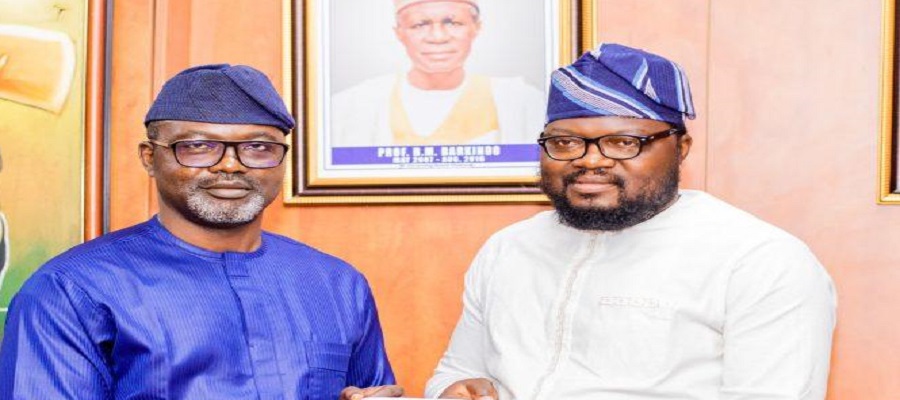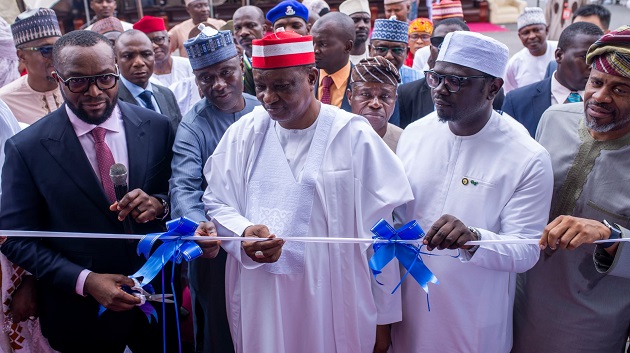News
Over 100,000 Farmers Benefit from Social Lender-OCP Africa Collaboration

As part of efforts to alleviate the suffering of Nigerians in the rural communities during the Covid-19 crisis, over 100,000 smallholder farmers have got personalized financial services, even as Social Lender – a fintech company and OCP Africa – one of the largest fertilizer companies in Africa are working together.

More than 60% of smallholder farmers in Nigeria do not have Bank Verification Number (BVN) and are currently unbanked or under-banked. To alleviate this problem, Social Lender has collaborated with OCP Africa to bring financial services to Nigerians especially those in the value chain.
Millions of smallholder farmers lack BVN. It is one of many indicators of the absence of financial inclusion. This has led to a lack of economic inclusion and poverty among these farmers and other stakeholders.
Caleb Usoh, the Country Manager, OCP Africa Fertilizers Nigeria, said that the aim of the partnership “is to ensure financial inclusion of a larger percentage of smallholder farmers in the country through BVN registrations and financial literacy training”.
According to him, the collaborative effort will alleviate their sufferings and help them to improve their lives.
He added that the collaboration with Social Lender would help to prepare the farmers to gain access to competitive financial services provided by top institutions in Nigeria and beyond, and help improve their livelihood.
Explaining how the partnership was formed with Social Lender, Usoh said the company emerged as one of the winners of the prized grant of the OCP-supported Impulse Start-up Accelerator challenge fund programme.
“This has boosted the partnership and is reflected in the increased number of beneficiaries who have accessed the services on offer”, he said.
The partnership would allow Social Lender the opportunity to leverage OCP Africa’s existing 51 retail input distribution hubs called the One Stop Shop, which is spread across rural farming communities in Nigeria.
Social Lender would provide several services to the farmers which include a series of financial literacy training, financial inclusion through the creation of BVN accounts, mobile money and credit profiling as well as helping the farmers to obtain small scale loans.
Faith Adesemowo, the Chief Executive Officer of Social Lender, reiterated the importance of the partnership by inviting other organisations interested in serving the huge market segment to collaborate with Social Lender. She informed that her company “is currently building a low cost distribution infrastructure” model needed to serve the unbanked and under banked.
“We are building an innovative solution to serve this market effectively. The Social Reputation score is our main asset. For the offline market, we have started with a pilot in 2018 with CGAP, a division of the World Bank. Working with EFINA, we have scaled to six states including two Northern states. With OCP Africa partnership, we will add 31 locations and cover 14 states,” she said.
Adesemowo said the company is a fintech that works across all industries. “We have just chosen to have a strategic focus in agriculture due to the fact that a large number of the financially excluded are a part of this demography. Social Lender may someday become a full agritech but for now, we are fintech working in agriculture”, she said.
The Chief Operating Officer of Social Lender, Mudiaga Ogboru said that partnership with OCP has further unlocked the value in the agricultural value chain, as more farmers have gained access to formal financial service like agro-loans, equipment leasing financing, fertilizer on credit, quality seeds and other agro-necessity.
“We are building a network for trust, credit and much more. For us, financial literary is the bedrock for financial inclusion and economic inclusion. We have built a robust financial literacy curriculum that is sufficiently equipped and digestible to the farmers because it is communicated in a language that is most comfortable for the farmers,” he said.
Many farmers have already benefited from the partnership. One of them, Jibril Mansur, from Kaduna, lauded the initiative. He has joined the financial ecosystem programme because it was brought to his community.
Hajiya Aisha, another beneficiary from Kano expressed how the opportunity has changed her life. She is currently gradually being upgraded from an unbanked customer with no bank account, BVN, and access to credit into the formal financial system. “This is a level 10 on Social Lender’s digital financial inclusion journey”, Ogboru explained.
Ogboru said the partnership was launched as part of the OCP Africa Covid-19 palliative intervention which was implemented in 32 locations across 12 states in Nigeria.
News
DBI, Miva Open University Partner to Advance Digital Innovation, Education

Digital Bridge Institute (DBI) and Miva Open University, Abuja, have signed a Memorandum of Understanding (MoU) to jointly promote digital technology and academic excellence in computer science and innovation.

Mr. David Daser, president/CEO, DBI, and Professor Tayo Arulogun, vice chancellor, Miva Open University.
DBI, a Federal Government-owned ICT training institute with headquarters in Abuja and campuses across Nigeria’s six geo-political zones, hosted the signing ceremony at its headquarters.
The MoU marks a significant step in formalizing and strengthening the existing relationship between the two institutions.
Signing on behalf of their institutions were
Speaking during the event, Mr. Daser praised Professor Arulogun’s leadership and commitment to academic development, which he said made the partnership possible. He emphasized that unlike many MoUs that remain inactive, this collaboration is set to deliver tangible results.
“We value this partnership and are confident it will meaningfully contribute to Nigeria’s education sector. DBI is fully prepared to implement the agreement and drive an impact across our campuses in Enugu, Abuja, Kano, Lagos, Asaba, and Yola,” Daser said.
He added that the collaboration would strengthen DBI’s National Innovation Diploma (NID) program and other initiatives through shared resources and new opportunities.
Professor Arulogun, in his remarks, highlighted the need for greater collaboration among Nigerian universities, criticizing the prevalent “do-it-alone syndrome.”
“Many institutions prefer to operate in silos, but collaboration is key. Pooling resources and working together will enhance capacity and academic output,” he stated. “With this partnership, we are ready to hit the ground running from student exchange to joint innovation projects like hackathons.”
He noted that hackathons provide platforms for discovering hidden talents and fostering innovation, and Miva is eager to integrate such activities into its academic programs.
Mr. Emeka Nzeih, head of Learning and Development, DBI, outlined the partnership’s key focus areas: student internships, real-world project collaborations, joint research in fields like AI, robotics, and cybersecurity, and shared access to DBI’s ICT labs and equipment for Miva’s students and faculty.
According to Nzeih, the initiative aims to enhance practical learning, foster innovation, and build capacity through collaborative training, research, and mentorship.
News
FIRS Commits to Fostering Trust, Voluntary Compliance Nationwide @ Tax Clinic

The Federal Inland Revenue Service (FIRS) has reaffirmed its commitment to fostering trust and voluntary tax compliance among small businesses, startups, and informal sector operators across the country.

This pledge comes ahead of the 2025 edition of its flagship outreach programme, the Tax Clinic, an initiative aimed at deepening tax education and strengthening compliance across Nigeria’s economic sectors.
Speaking in anticipation of the event, the Executive Chairman of FIRS, Dr Zacch Adedeji, emphasised that the clinic forms part of broader efforts to promote transparency, accountability, and inclusion in the tax system.
“The clinic reflects our commitment to promoting a culture of voluntary compliance by bringing tax education closer to the people. It is a critical step in strengthening trust, transparency, and inclusion in the tax system,” Dr Adedeji stated.
He noted the importance of expanding the country’s tax base and ensuring that citizens and business operators are empowered to fulfil their civic obligations.
“This clinic is more than an event; it’s a movement to ensure every Nigerian understands their role in nation-building through voluntary tax compliance,” he added.
Organised by the FIRS Emerging Taxpayers’ Group (ETG), the two-day event will feature expert-led sessions, panel discussions, interactive service desks, and live Q&A forums on issues such as tax filing, business registration, and dispute resolution.
Attendees will also have access to representatives from key institutions, including the Lagos State Internal Revenue Service (LIRS), Joint Tax Board (JTB), Corporate Affairs Commission (CAC), Tax Appeal Tribunal (TAT), National Identity Management Commission (NIMC), and Nigerian Investment Promotion Commission (NIPC).
Several professional bodies will also participate, including the Chartered Institute of Taxation of Nigeria (CITN), Institute of Chartered Accountants of Nigeria (ICAN), Association of National Accountants of Nigeria (ANAN), Nigerian Bar Association (NBA), and Nigerian Medical Association (NMA).
In addition to tax advisory services, the NMA will provide free basic medical screenings at the event. The first 300 participants to register physically will also receive branded gifts.
The clinic is open to business owners, self-employed individuals, trade groups, and professionals, with livestream options available for virtual participants.
With the theme ‘Tax Clinic for Tax Clarity’, the event is scheduled to take place on 15th and 16th July 2025 in Lagos.
FIRS says the initiative is central to its drive to boost revenue generation, integrate the informal economy, and streamline Nigeria’s tax architecture in line with its economic development agenda.
News
FG Commissions Rebuilt Kano Digital Industrial Park with Support from IHS Nigeria

The Federal Government has commissioned the fully refurbished and restored Kano Digital Industrial Park, reaffirming its commitment to inclusive digital growth, youth empowerment, and strong private sector collaboration.

The facility, which suffered significant damage during the August 2024 protests, has now been fully restored through a generous intervention by IHS Nigeria.
The commissioning ceremony, which took place on Wednesday, July 2, 2025, was led by the President of Nigeria, ably represented by the Honourable Minister of Communications, Innovation and Digital Economy, Dr. Bosun Tijani.
The event was graced by several dignitaries, including the Deputy Governor of Kano State (representing the Governor) Aminu Abdussalam Gwarzo; the Emir of Kano, represented by His Highness, Jarman Kano, Amb. Ahmed Umar OON; the Executive Vice Chairman/CEO of the Nigerian Communications Commission Dr Aminu Maida; the Minister of State for Youth Development; representatives from IHS Nigeria; and other senior government officials.
Delivering his opening remarks, the Executive Vice Chairman of the NCC, Dr. Aminu Maida, emphasized the strategic importance of the park and reaffirmed the Commission’s commitment to enabling Nigeria’s digital future.
“The recommissioning of the NCC Digital Industrial Park in Kano is a landmark moment in our journey to accelerate ICT innovation and empower the next generation of digital pioneers.
“This facility will serve as a catalyst for digital inclusion, economic transformation, and youth empowerment not just in Kano, but across the entire Northwest region. We remain committed to creating a thriving digital ecosystem where innovation can flourish and no one is left behind in Nigeria’s digital revolution.” He said.
Speaking on behalf of the Executive Governor of Kano State, the Deputy Governor, Comrade Aminu Abdussalam Gwarzo, reaffirmed the state’s digital ambition and expressed deep appreciation for the partnership that made the park’s restoration possible.
“This commissioning marks more than the unveiling of a refurbished structure, it represents Kano’s bold vision to lead Northern Nigeria’s digital transformation. “We are grateful to IHS Nigeria for their swift response and unwavering support following the vandalization of this facility. Their commitment goes beyond corporate responsibility, it reflects a shared vision for a digitally inclusive Nigeria. He said.
Also speaking at the commissioning ceremony, the Chief Operating Officer of IHS Nigeria, Kazeem Oladepo, who represented the CEO of IHS Nigeria, reaffirmed the company’s commitment to advancing Nigeria’s digital future.
“Our decision to sponsor the refurbishment of the Kano Digital Park is rooted in our commitment to supporting Nigeria’s digital economy and empowering young Nigerians with the skills to thrive in the digital age,” he said.
“This partnership with the Ministry of Communications, Innovation and Digital Economy is a clear demonstration of the power of public-private collaboration in addressing national challenges.
“We are proud to contribute to the 3MTT program and help restore this park as a hub of innovation and opportunity for the Kano community. Supporting initiatives like this and others such as the Ilorin Innovation Hub is how we aim to foster long-term digital growth, create jobs, and drive inclusive development across Nigeria.” He added.
Capping off the event, the Honourable Minister of Communications, Innovation and Digital Economy, Dr. Bosun Tijani, highlighted the significance of public-private collaboration in shaping Nigeria’s digital future.
“The recommissioning of the Kano Digital Industrial Park is a powerful demonstration of what is possible when public and private sector actors unite behind a shared vision. This facility is more than just infrastructure, it is a beacon of innovation, resilience, and opportunity for Northern Nigeria.
“IHS Nigeria’s swift intervention following the vandalism of this park reflects true partnership and corporate citizenship. Together, we are laying the foundation for a future where young Nigerians, especially those in underserved communities, have the tools and training to thrive in a digital economy.” He highlighted.
The Kano Digital Industrial Park forms a key part of the 3 Million Technical Talent (3MTT) initiative, a flagship government program aimed at equipping Nigerians with globally competitive digital skills.
The renovation includes fully equipped training labs, power and connectivity infrastructure, upgraded learning spaces, and restored digital equipment to support thousands of learners across Northern Nigeria.
The commissioning of the Kano Digital Industrial Park comes just weeks after Ilorin Innovation Hub, the largest innovation hub of its kind in West Africa, which is also sponsored by IHS Nigeria, kicked off its incubation and acceleration programs. These interventions highlight IHS Nigeria’s continued commitment to fostering innovation, creating jobs, and driving the growth of Nigeria’s digital economy.
By bringing the Kano Digital Industrial Park back on stream, IHS is reinforcing its pledge to support impactful initiatives at both the federal and sub-national levels, particularly those that provide opportunities for young Nigerians, who represent the future of the nation.

 Telecom3 days ago
Telecom3 days agoAVEVA Highlights Climate Impact Gains in 2024 Sustainability Report

 General News3 days ago
General News3 days agoAfCFTA Opens Opportunity for Logistics Sector

 Telecom3 days ago
Telecom3 days agoALTON Explains SIM-related Services Disruption Across Mobile Networks

 Telecom2 days ago
Telecom2 days agoNCC Approves MTN, 9Mobile Roaming Collaboration Deal

 E-Financial2 days ago
E-Financial2 days agoWorld Bank Approves Extra $65m for Nigeria’s SPESSE

 Telecom3 days ago
Telecom3 days agoMTN Foundation, NDLEA, UNODC Unite in Abuja Against Substance Abuse

 E-Financial2 days ago
E-Financial2 days agoEcobank Taps Google Cloud to Deepen Financial Inclusion

 E-Business2 days ago
E-Business2 days agoCAC Launches AI-powered Business Registration Portal






















